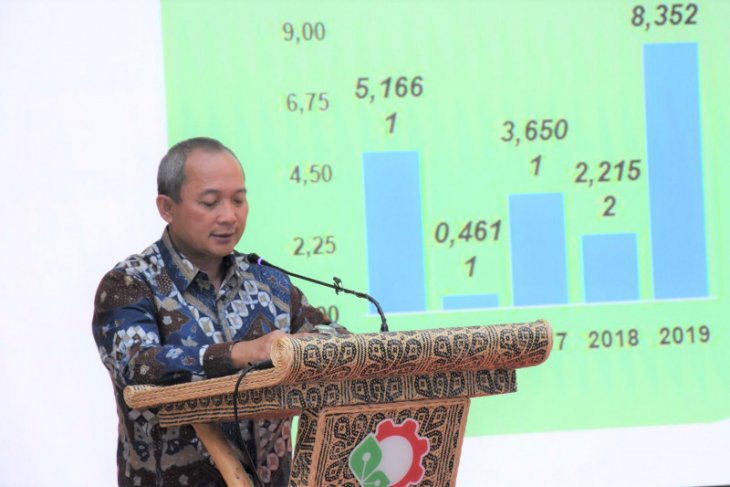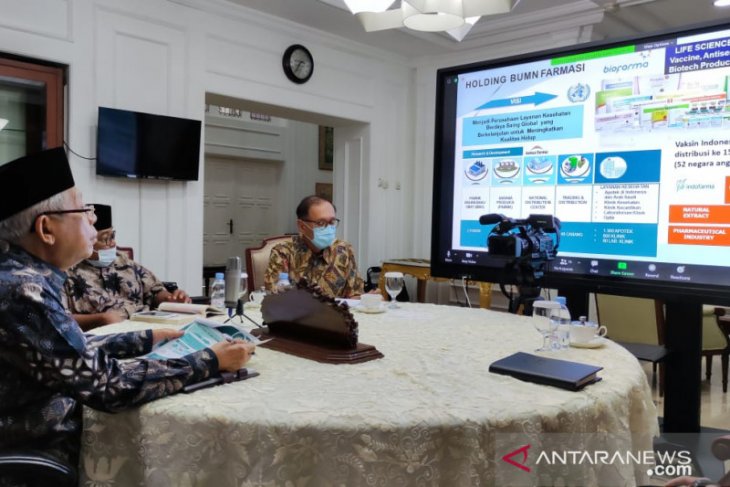Live Streaming
Program Highlight
Company Profile

Ani Hasanah
Jakarta (VOI News) - Chairman of the National Economic Recovery and Transformation Task Force Budi Gunadi Sadikin in Jakarta on Friday, August 28, noted that the government plans to continue assistance for small and medium micro-entrepreneurs to overcome the COVID-19 pandemic.
Budi admitted that the government has distributed 2.4 trillion rupiahs as assistance for micro-entrepreneurs for one week. Totally, the government has budgeted 22 trillion rupiahs for 9 million micro-entrepreneurs in Indonesia to drive Indonesia's economy in the third quarter.
“They are classified as micro-entrepreneurs and being registered with the Ministry of Cooperatives and Small Medium Enterprises (KemenKOPUKM) and then entering the banking system, banks can see the business of the micro-entrepreneurs,” said Budi Gunadi Sadikin.
It has not been touched and has not been seen by Indonesian banks. Thus, bankers are constantly looking for customers, naturally. They will see that currently there are about 15 million potential new micro-entrepreneurs that the government can provide bank credit to.
The government with the Coordinating Ministry for the Small and Medium Enterprises realizes that by doing this program as the first step, giving a grant of 2.4 million to a potential 15 million micro-entrepreneurs.
The government opens the opportunity to continue to the second phase of the program where the government can provide micro-business soft loans.
So, the government has planned to discuss it with the Ministry of Cooperatives and Small Enterprises and have discussed it with the Coordinating Ministry for the Economy, and the government will carry out to follow-up program to be able to provide micro-business soft credit programs to MSME entrepreneurs which the government previously gave a grant of 2.4 million earlier.
In the last few weeks, Budi Gunadi Sadikin stated that the disbursement of aid funds by the government is big enough. He said, in the social protection sector, the government has disbursed additional assistance of 7 trillion rupiahs, while in the MSME sector, additional assistance has reached 11.2 trillion rupiahs.
Budi hopes that this assistance will not only be short-term but also long-term in order to build fundamental economic changes. (VOI/Andy/trans:AF)
Jakarta (VOI News) - The Indonesian Ambassador to Mexico, Cheppy T. Wartono, invited the Indonesian economic stakeholders and the Indonesian government to see Mexico as a potential market. This was conveyed by Cheppy T. Wartono to Voice of Indonesia in Jakarta, Thursday (27/08). Cheppy said there are 3 (three) reasons why Mexico is a potential market for Indonesia. Firstly, Mexico's population which nearly reaches 130 million people, secondly Mexico's gross domestic product (GDP) per capita of US $ 10,200, and thirdly, Mexico could become a hub for Indonesian products in Latin America and the United States.
"The first is the population that is approaching 130 million people. The second is GDP (Gross Domestic Product) per capita in Mexico which stood at 10,200 (US Dollars). Third, we can make Mexico a hub for Indonesian products to enter the Latin America market, as well as in the US market. Because we know Mexico has also enforced its USMCA (United States-Mexico-Canada Agreement) as of July 1," said Cheppy T. Wartono to Voice of Indonesia via a short message.
The Indonesian Ambassador to Mexico, Cheppy T. Wartono, further said that there are 3 steps that could be taken to improve the economic relations between Indonesia and Mexico. The first, according to Cheppy, is through a trade agreement, but not a trade agreement between Indonesia and Mexico, but a trade agreement through the Pacific Alliance of which Mexico is one of its members in addition to Chile, Peru, and Colombia.
The second step, Ambassador Cheppy T. Wartono said by doing a massive promotion. Next year Cheppy hopes to realize the Indonesian Expo in Mexico by inviting 200-300 Indonesian entrepreneurs to enter Mexico. The last step, according to Cheppy, is to create a joint committee or employers' association in these 2 countries which will be able to formulate steps, especially in the economic sector. (VOI / ADVENT / AHM)
August

Head of the Industry Research and Development Agency at the Ministry of Industry, Doddy Rahadi. (ANTARA/Industry Ministry Public Relations Bureau)
The Ministry of Industry is pushing for a circular economy approach in the development of domestic battery technology for supporting the national electric vehicle industry.
"Batteries are key components in electric vehicles, contributing to around 25 to 40 percent of their price," said the head of the Industry Research and Development Agency at the Ministry of Industry, Doddy Rahadi, in a statement received here on Thursday.
He made the statement at an online seminar on ‘2020 Material Technology and Engineering Goods’.
He said that electric vehicles use lithium-ion batteries with cathode active ingredients, including the elements lithium, nickel, cobalt, manganese, and aluminum. The cathode itself accounts for about 34 percent of the price of lithium battery cells.
The ministry is encouraging the processing of materials domestically to allow more economical pricing, considering Indonesia possesses abundant natural resources that can be used as active ingredients, Rahadi said.
The Ministry of Industry is trying to promote import-substitution in the energy sector by making NMC-based active cathode materials (nickel-manganese-cobalt), wherein the process of making these active materials uses Indonesian smelter industrial products. However, the import-substitution process for cathode active materials has faced problems, including sourcing of lithium, he informed.
Rahadi said Indonesia does not have natural sources of lithium and in order to overcome this problem, the Ministry of Industry has initiated a lithium recovery process from recycled used batteries. The process of recovering lithium from used batteries is also known as urban mining.
Research related to urban mining is very reliable, and developed countries are no exception, he pointed out. In producing countries, urban mining is being used as a solution to maintain sustainable production, he informed. With this innovation, Indonesia will be able to have lithium reserves even though it has no natural lithium sources, he said.
"This effort is also a form of a circular economy in the energy sector, especially electric vehicles," he remarked.
He further said that the government's seriousness in developing battery-based electric motorized vehicles is reflected by the signing of Presidential Regulation (Perpres) Number 55 of 2019 concerning the Acceleration of Electric Motor Vehicles Development.
The presidential decree can serve as the basis for automotive industry players in Indonesia to immediately compile a design for the development of electric cars.
"The government is targeting that in 2025, around 25 percent, or 400 thousand units of Low Carbon Emission Vehicles (LCEV), will be in the Indonesian market," Rahadi added.
To encourage the development of domestic electric vehicle batteries, efforts are needed to utilize existing natural resources as well as substitute imported battery components, which can be supported by the down-streaming of the lithium battery industry, he emphasized.
It is now a challenge for academics, industry players, government, researchers, engineers, and domestic associations to materialize such a concept, he said. (ANTARA)
August

Vice President Ma'ruf Amin gets an update from PT Bio Farma on the progress of COVID-19 vaccine production, at his official residence in Jakarta on Thursday (August 27, 2020). (ANTARA / Secretariat of Vice President)
Vice President Ma'ruf Amin has asked PT Bio Farma to accelerate the production of the COVID-19 vaccine, saying that would be the most effective way to contain the pandemic.
"I hope, especially in vaccine products, I ask for it (vaccine production) to be faster because the situation really needs it. So, the only effort to overcome this COVID-19 is from (producers of) vaccines," Vice President Ma'ruf Amin said during a teleconference with the directors of PT Bio Farma in Jakarta on Thursday.
The level of transmission of COVID-19 is still quite high in Indonesia because there are still many people who are not disciplined in implementing health protocols, Ma'ruf remarked.
In addition, he noted, other efforts currently implemented by the government have not significantly reduced the spread of COVID-19 infections.
“(The steps taken by the government to curb coronavirus infections) Through health protocol efforts, through other countermeasures, are still ineffective. The healing has started well, but the transmission is still quite high," he pointed out.
Therefore, Vice President Ma'ruf directly asked the president director of PT Bio Farma, Honesti Basyir, to speed up the production process, including the halal certification process for the COVID-19 vaccine.
Meanwhile, Honesti said he would coordinate with the Indonesian Ulema Council (MUI) without delay regarding the halal certification for the vaccine.
"We will follow all of the Vice President's directions. Whatever the progress, we will immediately coordinate with the MUI team," Honesti said during the teleconference.
PT Bio Farma is working with China-based pharmaceutical company Sinovac and United Arab Emirates-based company G42 to produce COVID-19 vaccines.
Sinovac will provide raw materials to Indonesia for the production of 20 million doses of the COVID-19 vaccine by the end of 2020 and for 250 million doses by 2021. The vaccine which is being developed with raw materials procured from China is currently undergoing the third phase of clinical trials in Bandung, West Java.
Meanwhile, G42 will provide raw materials for 10 million doses by December 2020 and for 50 million doses in the first quarter of 2021. (ANTARA)



